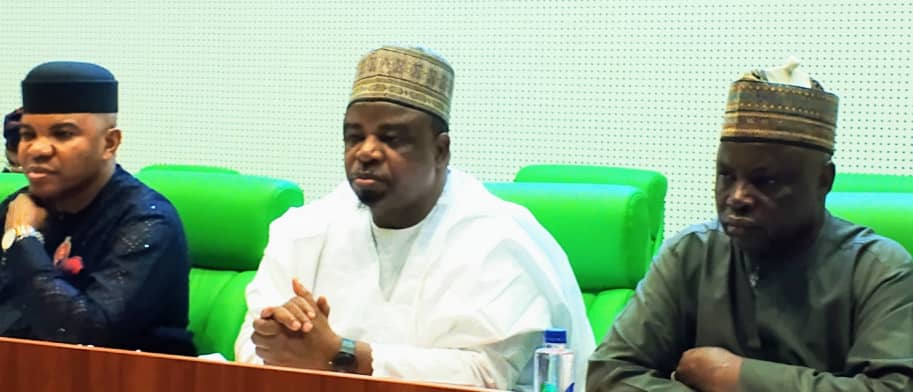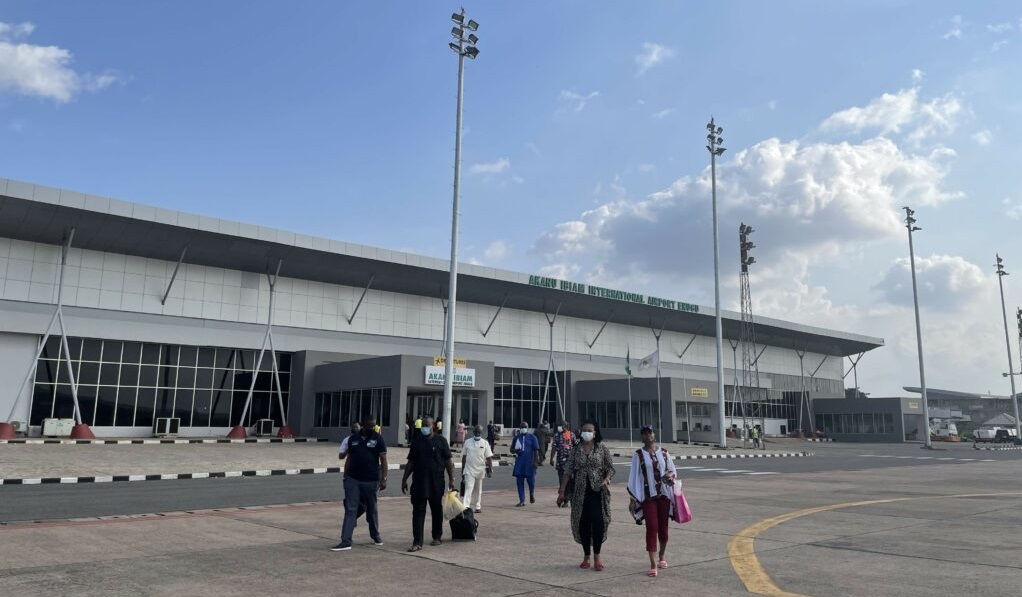News
Stakeholders Reject Amendment Of Public Procurement Act

News
Enugu Airport to reopen Monday — FG

The Federal Government of Nigeria has announced that Akanu Ibiam International Airport in Enugu, Enugu State, will reopen for flight operations on Monday, 28th April 2025, following the completion of emergency runway repairs.
On April 18th, 2025, the Federal Airports Authority of Nigeria (FAAN) announced that, due to a sudden and significant rupture in the asphalt surface at a critical section of the runway, the runway would be shut down for emergency repairs.
According to a statement by Mrs. Obiageli Orah, Director of Public Affairs and Consumer Protection, work was scheduled to begin on April 22nd and conclude before reopening on May 6th, 2025. However, rehabilitation works on the runway have been completed earlier than anticipated, and the runway has been cleared for landings and takeoffs by the engineers working with FAAN.
“FAAN appreciates all airport users and stakeholders for their understanding and cooperation during this time. The Authority sincerely apologises for the inconvenience but assures the public that all actions were taken in the interest of safety,” the statement read.
News
COVID-19 Vaccine Killed Pope Francis, says Pastor Oyakhilome

Pastor Chris Oyakhilome of LoveWorld Incorporated has claimed — without proof — that the COVID-19 vaccine was responsible for the death of Pope Francis.
In a video of a programme held on Thursday, which has since gone viral on YouTube, Oyakhilome alleged that the late Pope had aligned himself with “globalists” by promoting COVID-19 vaccines, a decision he said ultimately led to his death.
“I pointed it out during your LoveWorld Specials,” Oyakhilome said.
“While he was trying to encourage the world to take the vaccines, he stated that if Jesus were here, he would have taken the vaccine, and I found that very insulting.”
The televangelist went further to claim that the Pope’s stroke, reported as the immediate cause of death, was a result of blood clots triggered by the vaccine. Speaking to his congregation, Oyakhilome asked a medical doctor present whether a blood clot could cause a stroke. After receiving an affirmative response, he asserted: “The vaccine killed the Pope.”
“Blood clots is one of the most common causes of death from the vaccine. He’s not the only one. Many of them who became ill will not tell you. No one is going to tell you he died as a result of the vaccine. I warned you. I warned the world about taking those mRNA vaccines. No vaccine is good, not one of them, and they have never worked; it’s always been a deception,” said Oyakhilome.
“They have these people dying, they won’t tell you the cause. They dress it up. They get sick and they can’t be cured. They get sick and sick and worse and worse until it kills them. For some, very quickly. They call it sudden death syndrome. So, just remember that I warned you.
“This was a very healthy pope, and I told you that once that substance is inside your body, it can’t leave, it doesn’t go away. They have no scientific way to remove it because they never planned to remove it. It was planned for death, to kill as many people around the world. I feel pained that a pope like that would have his life cut short. And many around the world may not know what led to it but I have told you what led to it. It was the vaccine.”
This is not the first time Pastor Oyakhilome has made unsubstantiated claims about vaccines. Since 2020, he has consistently propagated misinformation about COVID-19 vaccines, despite overwhelming scientific evidence proving their safety and effectiveness.
MEDICAL FACTS AND OFFICIAL STATEMENTS
Contrary to Oyakhilome’s assertions, official information from the Vatican states that Pope Francis was admitted to the Agostino Gemelli Polyclinic Hospital after battling bronchitis for several days. His health deteriorated with a diagnosis of bilateral pneumonia on February 18.
After 38 days of hospital care, the Pope returned to his Vatican residence at Casa Santa Marta, where he died following a stroke and subsequent irreversible cardiac arrest.
The Vatican, in a statement released Monday, confirmed that Pope Francis died of a cerebral stroke and heart failure.
It is also publicly known that in his youth, Pope Francis underwent surgery to remove part of a lung damaged by a severe respiratory infection, a factor that contributed to his declining health in later years.
In 2021, he was hospitalised for 10 days after intestinal surgery. He was again hospitalised in 2023 for bronchitis treatment and later for abdominal surgery to remove scar tissue and repair a hernia.
OYAKHILOME’S HISTORY OF FALSE CLAIMS
Since the onset of the COVID-19 pandemic, Oyakhilome has repeatedly made unsubstantiated claims. In 2020, he alleged that the COVID-19 lockdown in Nigeria was orchestrated to install 5G technology in Abuja and Lagos.
“The Federal Government was pushed to lockdown Abuja and Lagos specifically because of 5G,” he said.
“What killed people in Wuhan, China, was not the virus but the 5G.”
Oyakhilome also dismissed the use of face masks to prevent the spread of COVID-19, claiming it was political rather than scientific. He said, “Wearing [masks] is politics, it’s okay. But no one should lie to us [that] it’s science… In fact, scientifically, it’s dangerous to health.”
News
UK Tories mull replacing Badenoch as party leader after poor ratings

Unrest within the United Kingdom’s Conservative Party could see Kemi Badenoch booted out as leader after poll ratings for the party have dipped ahead of next week’s local elections.
The Tories are expected to lose a significant number of seats in the elections.
Polls indicated that Badenoch has performed poorly and focused on the wrong issues in the six months she has served as Tory leader.
More than two dozen members of parliament told Bloomberg that the British-Nigerian is not the right person to take the party into the next general election due by mid-2029.
Last year, Prime Minister Keir Starmer led the Labour Party to victory, ending 14 years of Conservative rule in the UK.
The Tories, who are looking to make a comeback, believe Badenoch should be replaced with Robert Jenrick, the right-wing shadow justice secretary.
Jenrick has voiced ambitions to unite the right-wing vote and reduce competition from Nigel Farage’s Reform UK, signaling internal challenges putting Badenoch’s leadership under significant pressure.
The decision also comes as Nigel Farage’s right-wing Reform Party has consistently outperformed the Tories in recent polls, threatening to replace them as the main force on the right.
Badenoch has focused on several issues that critics consider the “wrong” or problematic priorities for the Conservative Party at this time.
She has concentrated heavily on opposing what she terms “left-wing nonsense”, including excessive regulation and identity politics.
Critics say she has failed to demonstrate clear, detailed policy frameworks and has focused instead on broad conservative principles and cultural issues, raising concerns about the party’s ability to present a comprehensive political agenda to voters.
-

 News18 hours ago
News18 hours agoList of World Leaders that are present in the final funeral of Pope Francis
-

 News14 hours ago
News14 hours agoJust in: Gunmen invade pro-Wike group in Bayelsa
-

 News22 hours ago
News22 hours agoDefections: Teejay Yusuf traces genesis of PDP palaver, key issues affecting Nigeria’s largest opposition party
-

 News24 hours ago
News24 hours agoCBEX: EFCC declares four persons wanted over crypto fraud + photos
-

 News19 hours ago
News19 hours ago2Face estranged wife, Annie Macauley breaks silence after he married Natasha
-

 News24 hours ago
News24 hours agoScandal! Osun monarch, pastor admit to COVID-19 fraud in US
-

 Politics22 hours ago
Politics22 hours agoUgochinyere remains Nigeria’s number one Hushpuppi of politics-Olayinka carpets Imo Rep
-

 Entertainment19 hours ago
Entertainment19 hours agoMohbad’s Inquest: Pathologist reveals major findings following 2nd autopsy


















